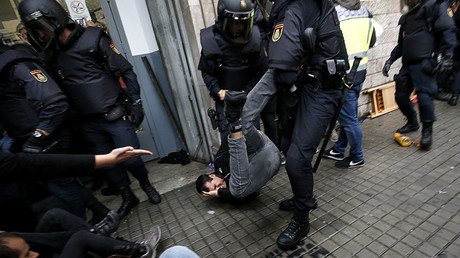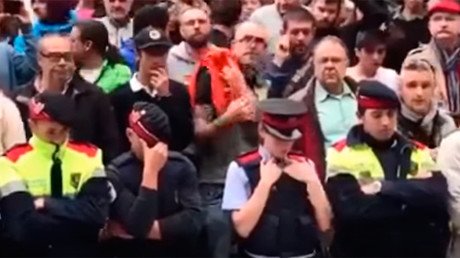‘We’re the f***ing law here’: Rowdy off-duty Spanish cops cause ruckus in Barcelona bar
A group of seven off-duty Spanish policemen have reportedly been accused of unruly behavior in a Barcelona bar. They damaged property and allegedly abused Italian-speaking waiters, mistakenly thinking they were conversing in Catalan.
The bar’s owners called the Mossos d'Esquadra, the police force of Catalonia, after being shocked at the aggression and destruction being caused by the group of customers. On arrival, the local police discovered that the trouble-makers were actually off-duty Spanish policemen.
According to eyewitnesses, the Spanish officers had been causing a disturbance since their arrival at the bar, El Mon reported. They shouted, disturbed other clients and treated the Italian-speaking waiters rudely. The officers appear to have confused them with local Catalans and demanded that they speak Spanish because "Barcelona is Spain." The aggression further escalated when the officers reportedly refused to pay, asking staff to bring the “same again.” One of the waiters refused, saying the bar was closing, but the officers reportedly replied: "We are the f***ing law here, in Barcelona! You close and open when we say so!"
When Catalan police offers arrived at the bar to deal with the incident on Monday night, their Spanish counterparts called them "rats" and "Catalan b**ches," RAC1 reported.
Spanish police came under fire for using batons and rubber bullets when they stepped in to stop an independence referendum on October 1, after the local Catalan force refused to prevent the vote. The poll had been deemed illegal by the central authorities in Madrid.
Several Mossos officers told Reuters on condition of anonymity that the 17,000-strong force was split among those who opted for independence and those who opposed it. Three out of five officers said they would not resort to force to remove Spanish lawmakers from power.
“I‘m not going to use force and beat people with my baton if they are passive,” a 15-year Mossos veteran and secessionist said, adding that many others felt the same: “I would have to obey it. My family has to eat.”
On Friday, Prime Minister Mariano Rajoy will seek Senate approval to assume central control of Catalonia, including its government and the running of Mossos.
“At the moment Catalan society is deeply divided and that’s a fact that would be hypocritical to deny. The same division can be seen inside the police. First of all, we want to say that we remain calm. Of course, we will continue to do our everyday work no matter what happens. And we want the Catalan police to stay as the police for all Catalans,” Mossos spokesperson Valentin Anadon told RT.
The Spanish police crackdown during the vote resulted in over 800 people being injured across the region, according to Catalonia’s Health Department. Shortly after the referendum, the human rights commissioner of the Council of Europe contacted the Spanish interior minister, seeking “swift, independent and effective” investigations into allegations of disproportionate use of force by the police. Human Rights Watch slammed the actions of Spanish national police, saying they used “excessive force towards peaceful Catalans expressing their political opinion.”
Madrid argues, however, that the actions of Civil Guard and National Police were “prudent, appropriate and proportionate to the objective of ensuring compliance with the law and the rights of all citizens.”
The Mossos are a permanent fixture in Catalan society, having emerged from citizen militias in the 18th century.














